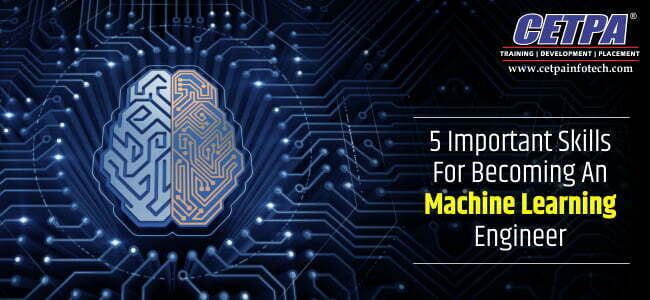5 Important Skills for Becoming A Machine Learning Engineer

Machine Learning is a study that makes computers work on their own based on their past experiences without being programmed explicitly or without human intervention. It is undoubtedly an emerging technology having a large number of applications. The major applications that have been adopting over the past few years include self-driving cars, practical speech recognition, effective web search, vastly improved understanding of the human genome, and Fraud Detection.
The following skills are needed to become a Machine Learning Engineer:
1.Computer Science Fundamentals and Programming
Machine Learning Engineers are required to learn the fundamental concepts of Computer Science. These include :
i. Data structures such as stacks, queues, multi-dimensional arrays, trees, graphs, etc.
ii. Algorithms such as searching, sorting, optimization, dynamic programming, etc.
iii. Computer architecture such as bandwidth, memory, cache, distributed processing, deadlocks, etc.
iv. Computability and complexity (P problems vs NP problems, NP-complete problems, big-O notation, approximate algorithms, etc.)
ML engineers often face situations where these concepts are applied. Refer for more details in Online Machine Learning Training Course
2.Data Modelling and Data Evaluation
Modeling is the process of predicting the structure of a given dataset. It predicts the generalization accuracy of a model on the future (unseen/out-of-sample) data. It aims to find useful patterns (correlations, clusters, eigenvectors, etc.) and predict the properties of previously unseen instances (classification, regression, anomaly detection, etc). Depending on the job, you must choose a suitable accuracy/error measure like log-loss for classification and an evaluation strategy. This involves continuous evaluation of the data model and often directly uses the errors produced to tweak the Model.
3.Probability and Statistics
Probability and statistics play a vital role in Machine Learning because the main goal is to reduce the probability of the error in the final output.
It is essential for an ML engineer to know the following:
i. Major concepts in probability such as conditional probability, Bayes rule, likelihood, independence, etc
ii. Statistics concepts such as various measures, distributions such as uniform, normal, binomial, Poisson, etc, and analysis methods such as ANOVA, hypothesis testing that is necessary for building and validating models from observed data.
4.Software Engineering and Software design
Ultimately the output which ML Engineer produce is a piece of software code. Usually, this code will be integrated into large software ecosystems where it must communicate with other components of the software using library calls, REST APIs, database queries, etc. So it requires a thorough understanding of system design techniques.
Some Major Design techniques include:
1. Scaling algorithms with the size of data
2. Communicating with different modules and components of work using library calls, REST APIs, and querying through databases.
3. Basic best practices of software coding and design, such as requirement analysis, version control, and testing.
4. Best measures to avoid bottlenecks and designing the final product such that it is user-friendly.
You can get more details on Online Machine Learning Courses.
Also Read: Machine Learning Career Path Is The Right Choice To Advance Student’s Career
5.Machine Learning Algorithms and Libraries
ML Engineers must know to work with packages, Libraries, algorithms to perform day-to-day duties and the major points that are required to be known include:
1. Knowledge in models such as decision trees, nearest neighbor, neural net, support vector machine, and a knack for deciding which one fits the best.
2. Proficiency in packages, APIs such as sci-kit-learn, Theano, Spark MLlib, H2O, TensorFlow, etc.
3. Choosing appropriate models like decision tree, nearest neighbor, neural net, support vector machine, an ensemble of multiple models, etc.
4. Learning procedures such as linear regression, gradient descent, genetic algorithms, bagging, boosting, and other model-specific methods
5. Understanding of how hyperparameters affect the learning model and the outcome.
These are the skills that every Machine Learning Engineer must possess and there are various online/offline Machine Learning courses available in the market and many people offer offline courses. It has a huge community of students and professionals as demand for it is increasing rapidly. There are many opportunities and huge scope for Machine Learning in near future. If you wish to kickstart your career in ML undoubtedly it is a good choice. Here are some online Machine Learning courses from top educators.



